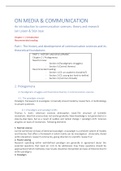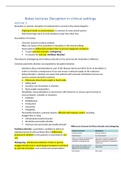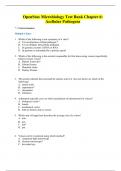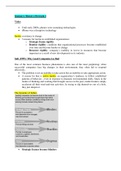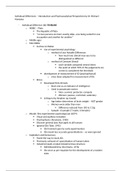A Midsummer Night’s Dream - Notes
https://myshakespeare.com/midsummer-nights-dream/act-3-scene-2
Act 1, Scene i
- Theseus and Hippolyta discuss their upcoming wedding. Theseus thinks that the four
days upcoming would take too long, Hippolyta reassures him that the few remaining
days would pass quickly, turning night and their wedding would happen in no time.
- To pass the time, Theseus orders Philostrate (Master of the Revels) to stir up the youth
of Athens and find ways for the couple to be entertained until their wedding.
- After Philostrate leaves, Theseus assures his fiancee that though he won her over with
his sword and combat skills, he would wed and live with her in another way (with pomp,
with triumph, and with revelling).
- Egeus enters the palace along with his daughter and two young men (one whom she
loves, the other who she is destined to marry), with a terrible problem.
- Hermia (his daughter) loves Lysander, however, her father wants her to marry the other
man, Demetrius.
- Hermia refuses to marry Demetrius for she doesn’t love him. Egeus, furious with his
daughter’s unwillingness to comply, demands that she be punished by the law if she
does not wed Demetrius, saying that she is his and as her father he can dispose of her
as he pleases.
- Theseus speaks to Hermia telling her that her father should be viewed as a god, he was
in fact the one who molded her, he has the ability to destroy her.
- Lysander is not a bad man Theseus says, but Demetrius has your father’s approval
which makes him better than Lysander.
- Hermia demands to Theseus what punishment would fall upon her if she decided not to
marry Demetrius.
- Theseus tells her that she would die or she would never be able to marry another man
(become a nun). She would never have any children, a husband, or any legacy to follow
her.
- Hermia proclaims she would rather die a virgin with no children, than to marry a man
whom she does not love just because her father wants her too.
- Theseus gives Hermia until his wedding to make her decision, whether she will become
a nun or die, or marry Demetrius.
, - Lysander supports his case, saying that he is as well off with material wealth and
education as Demetrius, moreover, he loves Hermia who loves him back.
- Furthermore Lysander makes his final plea to change Egeus’ mind, saying that just
recently Demetrius had slept with Helena and was just engaged to her, leaving her
before they married.
- Theseus says that he has heard of this, but the law is set and he is not able to change it
for one woman’s desires.
- Hippolyta, in dismay, is attempted to be comforted by Theseus as she is upset that
Hermia must befall these terrible punishments. Lysander and Hermia are left alone.
Together they complain about their terrible situation and the unfairness of it.
- They are destined to be together, but it seems as though the universe is against them.
Lysander tries to comfort her, telling her that the course of true love never does run
smooth, there will always be some obstacles.
- She is still in dismay, having to choose her love from another’s eyes.
- Lysander then proposes to Hermia, telling her to marry him at his widow aunt’s house,
which is outside of Athens, where the law cannot interfere with them, where they can
escape and live their lives together.
- Telling her to meet him in the forest that night, so they can run away. Hermia agrees
without hesitation, desperate to marry the man whom she loves no matter what they
must do, she wants to be with him.
- Helena enters, full of depression. Saying how she was jealous of Hermia’s beauty and
how Demetrius, who had loved her just before Hermia, now lost that love.
- The only thing that Helena wants was Demetrius, she wants Hermia’s help to win him
over, but Hermia cannot help her.
- Demetrius does not care of how Hermia treats him nor how Helena treats him, he still
loves Hermia and does not care for Helena anymore.
- As a final attempt to comfort Helena, they tell her their plan to escape Athens, and for
Lysander and Hermia to get married. Once Hermia is gone, Demetrius would surely fall
in love with Helena.
Helena then gives a soliloquy:
- Although she is as fair as Hermia, Demetrius does not desire her.
https://myshakespeare.com/midsummer-nights-dream/act-3-scene-2
Act 1, Scene i
- Theseus and Hippolyta discuss their upcoming wedding. Theseus thinks that the four
days upcoming would take too long, Hippolyta reassures him that the few remaining
days would pass quickly, turning night and their wedding would happen in no time.
- To pass the time, Theseus orders Philostrate (Master of the Revels) to stir up the youth
of Athens and find ways for the couple to be entertained until their wedding.
- After Philostrate leaves, Theseus assures his fiancee that though he won her over with
his sword and combat skills, he would wed and live with her in another way (with pomp,
with triumph, and with revelling).
- Egeus enters the palace along with his daughter and two young men (one whom she
loves, the other who she is destined to marry), with a terrible problem.
- Hermia (his daughter) loves Lysander, however, her father wants her to marry the other
man, Demetrius.
- Hermia refuses to marry Demetrius for she doesn’t love him. Egeus, furious with his
daughter’s unwillingness to comply, demands that she be punished by the law if she
does not wed Demetrius, saying that she is his and as her father he can dispose of her
as he pleases.
- Theseus speaks to Hermia telling her that her father should be viewed as a god, he was
in fact the one who molded her, he has the ability to destroy her.
- Lysander is not a bad man Theseus says, but Demetrius has your father’s approval
which makes him better than Lysander.
- Hermia demands to Theseus what punishment would fall upon her if she decided not to
marry Demetrius.
- Theseus tells her that she would die or she would never be able to marry another man
(become a nun). She would never have any children, a husband, or any legacy to follow
her.
- Hermia proclaims she would rather die a virgin with no children, than to marry a man
whom she does not love just because her father wants her too.
- Theseus gives Hermia until his wedding to make her decision, whether she will become
a nun or die, or marry Demetrius.
, - Lysander supports his case, saying that he is as well off with material wealth and
education as Demetrius, moreover, he loves Hermia who loves him back.
- Furthermore Lysander makes his final plea to change Egeus’ mind, saying that just
recently Demetrius had slept with Helena and was just engaged to her, leaving her
before they married.
- Theseus says that he has heard of this, but the law is set and he is not able to change it
for one woman’s desires.
- Hippolyta, in dismay, is attempted to be comforted by Theseus as she is upset that
Hermia must befall these terrible punishments. Lysander and Hermia are left alone.
Together they complain about their terrible situation and the unfairness of it.
- They are destined to be together, but it seems as though the universe is against them.
Lysander tries to comfort her, telling her that the course of true love never does run
smooth, there will always be some obstacles.
- She is still in dismay, having to choose her love from another’s eyes.
- Lysander then proposes to Hermia, telling her to marry him at his widow aunt’s house,
which is outside of Athens, where the law cannot interfere with them, where they can
escape and live their lives together.
- Telling her to meet him in the forest that night, so they can run away. Hermia agrees
without hesitation, desperate to marry the man whom she loves no matter what they
must do, she wants to be with him.
- Helena enters, full of depression. Saying how she was jealous of Hermia’s beauty and
how Demetrius, who had loved her just before Hermia, now lost that love.
- The only thing that Helena wants was Demetrius, she wants Hermia’s help to win him
over, but Hermia cannot help her.
- Demetrius does not care of how Hermia treats him nor how Helena treats him, he still
loves Hermia and does not care for Helena anymore.
- As a final attempt to comfort Helena, they tell her their plan to escape Athens, and for
Lysander and Hermia to get married. Once Hermia is gone, Demetrius would surely fall
in love with Helena.
Helena then gives a soliloquy:
- Although she is as fair as Hermia, Demetrius does not desire her.


